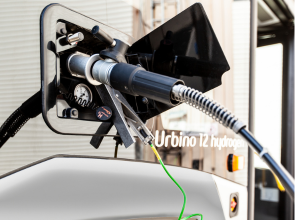Westport Fuel Systems unveils hydrogen HPDI fuel system for combustion engines
The HPDI fuel system technology uses compression ignition combustion, where most energy is derived from the combustion of, typically, a gaseous fuel.

Westport Fuel Systems Inc (an alternative fuel, low-emissions transportation Technologies company) revealed their H2 HPDI fuel system in a demonstrator truck.
Westport’s HPDI™ fuel system technology enables heavy-duty trucks to operate on bio-methane (renewable natural gas) and natural gas with the same power, torque, efficiency, and performance as diesel engines, and with even better results running on hydrogen, all while meeting global emissions regulations.
The H2 HPDI fuel system is in a fully functional demonstrator vehicle, to show the ease with which a commercially available, production LNG HPDI system can operate on a zero-carbon fuel like green hydrogen.
The H2 HPDI fuel system offers a cost-effective solution with a zero-carbon solution, that delivers, tank to tailpipe, up to 98% CO2 reduction over diesel, and allows manufacturers to leverage their investment in vehicle drivetrain design, supply chain and manufacturing by continuing to plan around low carbon hydrogen internal combustion engines.
The H2 HPDI demonstrator truck will be on display at the 2022 ACT Expo in Long Beach, California, May 9-12, 2022.
H2 HPDI Engine Specifications:
- Power & torque: 20% higher power and torque than the base diesel engine
- Efficiency: 5 to 10% better thermal efficiency than the base diesel engine
- Turbocharged 13 liter, in-line six-cylinder engine
- Fuel: Hydrogen, with pilot ignition
- Four-cycle, compression ignition, direct injection
- H2 HPDI
“We believe H2 HPDI is compelling, with near-zero greenhouse gas emissions at a lower cost than fuel cell vehicles or battery electric vehicles, particularly for heavy-duty, long-haul trucking,” said David Johnson, CEO, Westport Fuel Systems. “We have developed the engine to utilize the capability of HPDI to deliver what is needed today in the marketplace, using hydrogen in place of natural gas, with development work happening at Westport Fuel Systems facilities, and through previously announced programs with AVL/TUPY, and Scania. And we expect new H2 HPDI programs with other partners to come soon.”
Combustion is initiated via late cycle direct injection of a small quantity of pilot fuel, followed by direct injection of the primary gaseous fuel; both fuels are injected via a proprietary dual concentric needle injector design. By utilizing Diesel-Cycle thermodynamics, the HPDI fuel system retains the thermal efficiency, power, torque, and engine braking of the base diesel internal combustion engine.
“HPDI has long been established as matching diesel engine performance, and efficiency, and now we have demonstrated power, torque, and efficiency significantly exceeding that of the diesel base engine by migrating from Natural Gas HPDI to H2 HPDI,” said Scott Baker, vice president of Engineering, Westport Fuel Systems. “The advantage of HPDI combustion is that it retains the high compression ratio of the base diesel engine and does not suffer from engine knocking as the H2 is injected towards the end of the compression stroke just after pilot ignition and combustion begins.”
Anders Johansson, vice president Heavy-Duty OEM, Westport Fuel Systems, said, “Hydrogen is a promising next step for carbon neutral heavy-duty transportation applications, as a hydrogen fueled internal combustion engine enables carbon neutral transportation utilizing existing base engine technology, like our proven LNG HPDI fuel system technology.”
